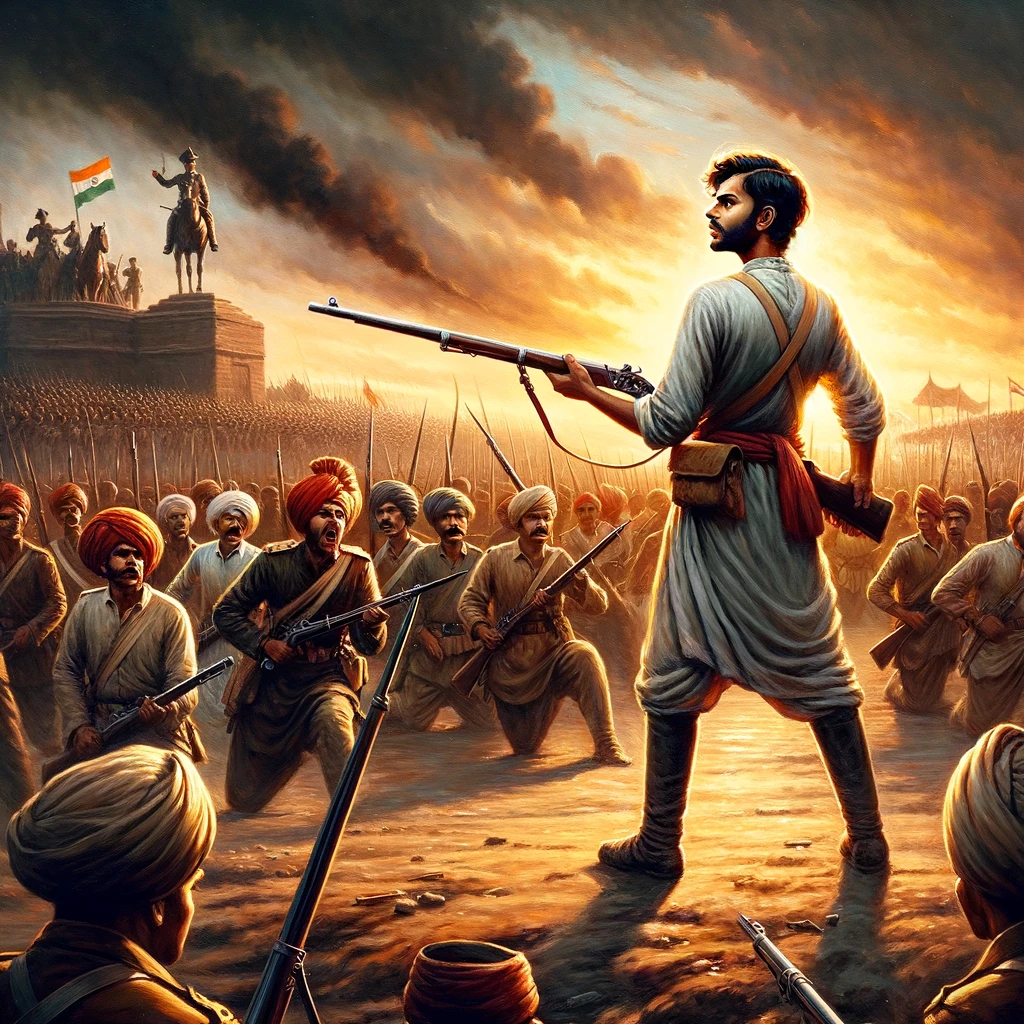Moments from 19th Week of Year
Exploring Timeless Narratives: Welcome to HinduInfoPedia
Welcome to HinduInfoPedia.org, your trusted source for genuine insights on a spectrum of topics ranging from Hinduism and India to global politics and history. Our mission is steadfast: to dispel the cloud of misinformation and counter negative narratives that often swirl around these subjects. As a non-profit organization, we are committed to returning the favor to society by fostering awareness and understanding that help in nurturing societal benefits, world peace, and environmental preservation.
Each week, we delve into historical events that have shaped not just India, but the world, illuminating their significance in today’s context. This blog is more than just a repository of information; it’s a beacon for those seeking to understand the intricate tapestry of past and present narratives, and a counter to often skewed international media portrayals. Join us as we explore pivotal moments in history through our weekly series, “This Week in History,” where we aim to educate, engage, and inspire our readers to contribute positively to our collective future.
Mutiny India 1857: A Brief Overview

After setting the stage with our commitment to shedding light on historical truths and narratives, let’s dive into a significant moment in history that resonates with our mission. This week in history, we reflect on a turning point that forever altered the course of Indian and colonial histories.
This Week in History: The Mutiny of 1857, often dubbed the First War of Indian Independence, marks a pivotal event in the colonial history of India. It began on May 10, 1857, with Indian soldiers, known as sepoys, in the British East India Company’s army initiating a rebellion. The revolt was sparked by grievances over various military, economic, and political injustices, notably the introduction of rifle cartridges believed to be greased with cow and pig fat, which offended both Hindu and Muslim troops. The mutineers quickly captured Meerut and then Delhi, proclaiming the elderly Mughal emperor Bahadur Shah Zafar as the symbolic leader of their cause.
Although the rebellion was eventually suppressed, it marked a significant turning point, leading to the end of the East India Company’s rule and the beginning of direct control by the British Crown in 1858. The mutiny significantly changed the British approach to governance in India, catalyzing reforms and laying foundational sentiments for the future Indian independence movement.
Winston Churchill (Becomes Prime Minister May 10, 1940):
Building on the overview of the 1857 Mutiny, it’s crucial to delve deeper into the events of May 10, a day marked by the courage and turmoil of the sepoy soldiers. Their uprising against the British East India Company not only challenged imperial rule but also sparked a wider movement for independence.
This Week in History marks the day Winston Churchill became the Prime Minister of the United Kingdom on May 10, 1940, during a critical period of World War II. His leadership, characterized by remarkable fortitude and powerful oratory, was crucial in bolstering British morale during the war’s darkest hours.
To view the darker side of Winston Churchill with respect to governence of India visit this blog.
Assassination Attempt on Pope John Paul II (1981):
Transitioning from the battlegrounds of World War II to a different kind of battle, we come to May 13, 1981, when an event shook the world’s moral and spiritual foundations. Pope John Paul II faced an assassination attempt, a moment of violence that tested and demonstrated the power of forgiveness and resilience.
This Week in History, on May 13, 1981, Pope John Paul II faced an assassination attempt by Mehmet Ali Ağca in St. Peter’s Square, Vatican City. The Pope was seriously injured with multiple gunshot wounds. This shocking event garnered massive global attention. Remarkably, Pope John Paul II later publicly forgave Ağca for the assassination attempt. After serving a prison sentence in Italy, Ağca was pardoned by the Italian president at the Pope’s request and was deported back to Turkey.
This Week in History: The Beatles’
From the dramatic and somber events at the Vatican, we rewind the clock to 1970 when another significant event captured the world’s attention in a markedly different arena. On May 13, The Beatles premiered their documentary ‘Let It Be,’ offering an intimate glimpse into the end of an era for the iconic band.
‘Let It Be’ movie premiered on May 13, 1970, showcasing the band as they prepared their final studio album. The film features footage of the band rehearsing and recording songs for their final studio album, also titled “Let It Be.” This documentary offers a raw and unfiltered look at the dynamics within the band during their recording sessions, which were part of the infamous period leading up to their eventual breakup. The film is significant for capturing the last moments of The Beatles working together as a group and includes their final live performance on the rooftop of Apple Records.
Jiddu Krishnamurti (Born May 11, 1895):
From the cultural impact of The Beatles, we turn to a profound philosopher born on May 11, 1895. Jiddu Krishnamurti, a thinker who challenged societal norms and urged an exploration of the mind, represents the intellectual rebellions that, like music, seek to transform society from within.
This Week in History, Jiddu Krishnamurti, born on May 11, 1895, emerged as a seminal figure in 20th-century philosophy and spirituality, advocating radical psychological change and the importance of mental freedom. Born in the small town of Madanapalle, Andhra Pradesh, India, he was adopted in his youth by the Theosophical Society with the expectation that he would become a global spiritual leader. However, Krishnamurti later renounced his destined role, disbanding the Order of the Star, the organization established to support his mission. He spent the rest of his life traveling the world, speaking to large audiences and individuals about the necessity of a revolution in the psyche of every human being, advocating a philosophy free from any creed, dogma, or religious discipline.
Gopal Krishna Gokhale (Born May 9, 1866):
Reflecting on the themes of thought and freedom introduced by Krishnamurti, we step back in time to honor Gopal Krishna Gokhale, born on May 9, 1866. Gokhale’s advocacy for education and political reform laid crucial groundwork for India’s struggle towards self-rule, echoing the quest for mental and societal liberation.
This Week in History, we remember Gopal Krishna Gokhale, born May 9, 1866, a towering figure in pre-independence Indian politics and a key mentor to Mahatma Gandhi. Born into a humble Brahmin family in Ratnagiri, Maharashtra, Gokhale was one of the most articulate proponents of Swaraj, or self-rule, during an era when India was awakening to its nationalistic aspirations. His advocacy was not limited to political independence; he also championed social reforms such as education and fighting against untouchability, positioning education as a catalyst for social change and laying the groundwork for India’s future democratic structures.
Jahandar Shah (Born May 9, 1661):
As we contemplate the reformative efforts of Gokhale, we journey further back to another May 9th in 1661, to the reign of Jahandar Shah. His brief rule highlights the contrasts within India’s imperial past, marked by decadence and decline, setting the stage for the transformative movements that followed.
This Week in History, we reflect on Jahandar Shah, born May 9, 1661, whose brief Mughal emperor tenure from 1712 to 1713 was marked by hedonism and political ineptitude, which accelerated the decline of Mughal influence in India. Born to Emperor Bahadur Shah I, Jahandar Shah ascended to the throne after a bitter succession battle with his brothers, characterized by treachery and bloodshed. His reign was heavily influenced by his favorite concubine, Lal Kunwar, who was notorious for her own lavish and eccentric behaviors. The emperor’s disregard for state affairs allowed rampant corruption and decay to set in, which ultimately led to his defeat and execution by his nephew, Farrukhsiyar, underscoring the vulnerability of the Mughal dynasty during a period of rapid decline.
Maharana Pratap (Born May 9, 1540):

From the faltering steps of Jahandar Shah’s reign, we look to a figure of staunch resistance, Maharana Pratap, whose birth on May 9, 1540, predated the Mughal decline. His defiance against imperial conquest is a testament to the enduring spirit of independence that characterizes significant historical shifts
This Week in History, we honor Maharana Pratap, born on May 9, 1540, a Rajput king known for his staunch resistance against the Mughal Empire. He is celebrated for his steadfast resistance against the Mughal Empire, particularly in the Battle of Haldighati in 1576. Maharana Pratap’s defiance has made him an enduring symbol of bravery and resistance in Indian folklore and history.
Introduction of Birth Control Pill and its Ethical Implications
From the battlefield heroics of Maharana Pratap, we transition to a different kind of revolution that began in May 1960 with the introduction of the birth control pill. This innovation sparked a societal and ethical transformation, reshaping perspectives on personal freedom and reproductive rights
This Week in History marks the introduction of the birth control pill in 1960, a pivotal moment in reproductive health that provided women unprecedented control over their fertility. This advancement is often celebrated for empowering women and enabling more effective family planning within the confines of marriage. However, it also introduces ethical questions concerning sexual behavior outside of marriage, especially when viewed through the lens of various religious teachings on sexual morality.
Christian Perspective on the Birth Control Pill
Marital Sanctity and Sexual Morality
Christianity holds marriage as a sacred covenant intended for a lifelong union between a man and a woman, within which sexual relations are permitted and blessed. The faith considers any sexual activity outside this bond, including premarital or extramarital sex, as sinful behaviors categorized as fornication and adultery. Scriptural references such as 1 Corinthians 6:18-20 and Hebrews 13:4 strongly condemn sexual immorality and emphasize maintaining purity, treating the body as a temple of the Holy Spirit.
Ethical Dilemmas Posed by the Pill
While the birth control pill supports the concept of responsible parenthood within marriage, it arguably facilitates easier engagement in premarital or extramarital sexual activities, which directly contradicts Christian doctrines. This capability to separate sexual activity from procreation without immediate reproductive consequences might challenge adherents’ commitment to biblical sexual ethics.
Islamic View on the Birth Control Pill
Sexual Conduct and Zina
Islam promotes a clear framework for sexual ethics, where marriage acts as a protective boundary for relationships. The religion strictly prohibits extramarital and premarital relations, regarded as ‘zina’—a serious sin. The Quran offers explicit guidance against such behaviors, with Surah An-Nur (24:2-3) prescribing severe punishments to uphold social and moral purity.
Contraception’s Role Within and Beyond Marriage
While the pill can be seen as beneficial in managing birth within Islamic marriages, it also presents a moral paradox if it facilitates zina by easing the engagement in prohibited sexual relationships. This challenges the balance between personal control over fertility and adherence to Islamic sexual ethics.
Hindu Perspective on Contraception
Dharma and Marital Fidelity
Hinduism emphasizes ‘Dharma’ (moral duty), which includes fidelity and purity within the marriage. While not as explicitly restrictive as Christianity or Islam regarding premarital and extramarital sex, Hindu scriptures like the Manusmriti and Dharmashastras advocate for sexual relations within marital bounds. This stance aims to preserve family integrity and societal stability.
The Birth Control Pill and Ethical Considerations
Although Hinduism recognizes ‘Kama’ (pleasure), including sexual pleasure as a legitimate desire, it advocates fulfilling these desires ethically within marriage. The availability of the birth control pill supports family planning within these ethical boundaries but also raises questions about its impact on traditional values when used to facilitate sexual activities outside of marriage.
The Ethical and Moral Dilemma
The birth control pill undeniably supports health and autonomy, allowing couples within marriages to plan their families more effectively. However, when the usage of such contraception enables behaviors considered unethical by many religious doctrines, it presents a significant moral dilemma. This tension between advancing personal freedom and adhering to religious ethical standards highlights an ongoing debate in modern society, reflecting the complex interplay between technological advances and traditional values.
From the complexities of modern medical ethics to the stark realities of societal conflicts, “This Week in History: Moments from the 19th Week of the Year” encapsulates a spectrum of challenges and advancements that resonate deeply within and beyond India’s borders.
Lynching Incident in Mewat (2018):
On May 9, 2018, in the socio-economically complex region of Mewat, a deeply distressing event unfolded that tested the bounds of community and law enforcement relationships. Police efforts to apprehend local criminals were met with extreme hostility, leading to violent clashes with villagers. This confrontation escalated rapidly, resulting in the tragic death of a young man during the operation. This incident serves as a somber reminder of the ongoing struggles in areas fraught with socio-economic strife, where law enforcement actions can sometimes exacerbate tensions rather than quell them.
India’s Nuclear Tests in Pokhran (1998): A Strategic Milestone

Just as the events in Mewat reflect internal societal tensions, the week also commemorates a significant moment in India’s defense history that has had far-reaching implications for regional and global security. On May 11, 1998, India conducted three strategic nuclear tests at Pokhran, followed by two additional tests on May 13. These actions not only reaffirmed India’s nuclear capabilities but also led to a shift in international policies, resulting in economic sanctions from nations like the United States and Japan. The Pokhran tests are a stark contrast to the internal security issues highlighted in Mewat, yet both are intrinsically linked to how India navigates its internal and external security dilemmas.
Reflecting on Our Past, Shaping Our Future
In conclusion, our journey through the pivotal events of the 19th week across various eras and regions reflects the enduring impact of historical moments on contemporary society. From the courage displayed during the Mutiny of 1857 to the cultural shifts initiated by the Beatles and the introduction of the birth control pill, these events showcase the complex interplay between past actions and present realities. At HinduInfoPedia.org, we strive to bring these stories to light, offering insights that not only educate but also inspire our readers to appreciate the depth of our shared history and its implications for the future. Join us each week as we continue to explore and uncover the significant events that have shaped our world, fostering a well-informed community dedicated to truth and understanding.
Feature Image: Click here to view the image.
#HistoryToday, #OnThisDay, #HistoricalEvents, #IndianHistory, #WorldHistory



Leave a Reply